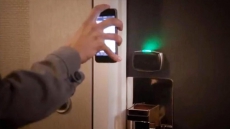VANCOUVER — The sight of an ungainly and mostly hairless white moose trudging into a northern British Columbia town has become the most visible sign of the winter tick problem in the province.
The parasite literally sucks the life out of its host while the moose stops feeding to spend time scratching and rubbing away its hair in an attempt to rid itself of its itchy burden.
Wildlife biologist Dustin Walsh calls them "townie moose."
"When they get into that severe state, moose will come out of the woods and into town centres. Somewhere where there's a little easier access to food and they feel a little bit safer almost because there's less predation."
By the time they get to the hairless state the so-called ghost moose likely won't survive the infestation of tens-of-thousands of ticks, he said.
The ticks, often spotted in cringe-worthy clusters, hop on a moose as larvae in the fall and spend the rest of their lives living off one animal. Female ticks first take blood soon after and can grow to 15 millimetres before they fall off in the spring.
"If there is enough tick burden it can actually cause anemia. In the course of a winter, under heavy tick loads moose can lose about 40 litres of blood," Walsh explained. The tick doesn't pose a threat to humans.
He said about eight per cent of the moose reported in a 2016 "citizen science" survey were ghost moose. But it's moose that aren't as badly affected or are healthy that Walsh really wants to know more about in the provincial government's 2017 survey.
It's been documented that moose numbers are declining in the province and while the tick isn't a driving factor in the downturn, there are a number of causes that may be converging to make the problem worse, he said.
Until the end of April, Walsh is looking for citizen scientists who spot a moose to help them assess the tick problem.
"We want to know about every moose seen, whether it's healthy, dilapidated, dead on the ground," he said. "One of the major biases is people are only sending in surveys of emaciated moose with ticks."
Previous studies say the number of ticks on infested moose can range from a few to tens-of-thousands, and in severe cases over 100,000 ticks on one animal.
The B.C. surveillance program relies on observations from both professionals and the public to help assess the problem. Anyone who has information can fill out a survey online, answering questions about the animal's hair loss and its general appearance.
The findings of the program are part of a research program started in 2013 to determine factors influencing moose populations in the province.
Walsh said he'd like to see the program go on for several years to better understand the tick's impact. He added the program is far more cost efficient than sending workers in the field or paying for helicopters.
As for a solution to the tick problem, Walsh said it isn't as easy as treating your dog once a month. Spring snow can help reduce the population, he said, as the ticks jump from their host and die in the snow.
Or there may be a way to burn the ticks from their hiding places when they are young.
"There's always been prescribed burning in B.C. It's a well know way to increase available forage for all different types of the ungulate populations," Walsh said. "If you could somehow co-ordinate prescribed burning with maybe areas of high tick load in the spring ... you could essentially burn them off."






